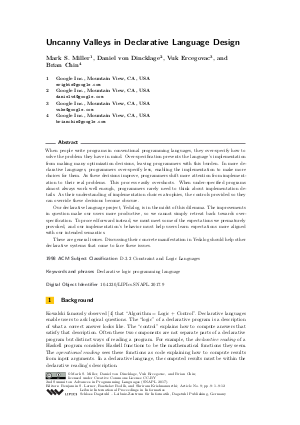Uncanny Valleys in Declarative Language Design
Authors Mark S. Miller, Daniel von Dincklage, Vuk Ercegovac, Brian Chin
-
Part of:
Volume:
2nd Summit on Advances in Programming Languages (SNAPL 2017)
Part of: Series: Leibniz International Proceedings in Informatics (LIPIcs)
Part of: Conference: Summit on Advances in Programming Languages (SNAPL) - License:
 Creative Commons Attribution 3.0 Unported license
Creative Commons Attribution 3.0 Unported license
- Publication Date: 2017-05-05
File

PDF
LIPIcs.SNAPL.2017.9.pdf
- Filesize: 411 kB
- 12 pages
Document Identifiers
Subject Classification
Keywords
- Declarative logic programming language
Metrics
- Access Statistics
-
Total Accesses (updated on a weekly basis)
0PDF Downloads0Metadata Views
Abstract
When people write programs in conventional programming languages, they over-specify how to solve the problem they have in mind. Over-specification prevents the language's implementation from making many optimization decisions, leaving programmers with this burden. In more declarative languages, programmers over-specify less, enabling the implementation to make more choices for them. As these decisions improve, programmers shift more attention from implementation to their real problems. This process easily overshoots. When under-specified programs almost always work well enough, programmers rarely need to think about implementation details. As their understanding of implementation choices atrophies, the controls provided so they can override these decisions become obscure. Our declarative language project, Yedalog, is in the midst of this dilemma. The improvements in question make our users more productive, so we cannot simply retreat back towards over-specification. To proceed forward instead, we must meet some of the expectations we prematurely provoked, and our implementation's behavior must help users learn expectations more aligned with our intended semantics. These are general issues. Discussing their concrete manifestation in Yedalog should help other declarative systems that come to face these issues.
Cite As Get BibTex
Mark S. Miller, Daniel von Dincklage, Vuk Ercegovac, and Brian Chin. Uncanny Valleys in Declarative Language Design. In 2nd Summit on Advances in Programming Languages (SNAPL 2017). Leibniz International Proceedings in Informatics (LIPIcs), Volume 71, pp. 9:1-9:12, Schloss Dagstuhl – Leibniz-Zentrum für Informatik (2017)
https://doi.org/10.4230/LIPIcs.SNAPL.2017.9
BibTex
@InProceedings{miller_et_al:LIPIcs.SNAPL.2017.9,
author = {Miller, Mark S. and von Dincklage, Daniel and Ercegovac, Vuk and Chin, Brian},
title = {{Uncanny Valleys in Declarative Language Design}},
booktitle = {2nd Summit on Advances in Programming Languages (SNAPL 2017)},
pages = {9:1--9:12},
series = {Leibniz International Proceedings in Informatics (LIPIcs)},
ISBN = {978-3-95977-032-3},
ISSN = {1868-8969},
year = {2017},
volume = {71},
editor = {Lerner, Benjamin S. and Bod{\'\i}k, Rastislav and Krishnamurthi, Shriram},
publisher = {Schloss Dagstuhl -- Leibniz-Zentrum f{\"u}r Informatik},
address = {Dagstuhl, Germany},
URL = {https://drops.dagstuhl.de/entities/document/10.4230/LIPIcs.SNAPL.2017.9},
URN = {urn:nbn:de:0030-drops-71299},
doi = {10.4230/LIPIcs.SNAPL.2017.9},
annote = {Keywords: Declarative logic programming language}
}
Author Details
References
-
Francois Bancilhon, David Maier, Yehoshua Sagiv, and Jeffrey D. Ullman. Magic sets and other strange ways to implement logic programs. In Proceedings of the 5th ACM SIGACT-SIGMOD Symposium on Principles of Database Systems, pages 1-15. ACM, 1985.

- Brian Chin, Daniel von Dincklage, Vuk Ercegovac, Peter Hawkins, Mark S. Miller, Franz Och, Christopher Olston, and Fernando Pereira. Yedalog: Exploring knowledge at scale. In Proc. of the 1st Summit on Advances in Programming Languages (SNAPL 2015), volume 32 of LIPIcs - Leibniz International Proceedings in Informatics, pages 63-78. Schloss Dagstuhl - Leibniz-Zentrum fuer Informatik, 2015. URL: http://dx.doi.org/10.4230/LIPIcs.SNAPL.2015.63.
- Jason Eisner and Nathaniel W. Filardo. Dyna: Extending Datalog for Modern AI (full version), 2011. URL: https://www.cs.jhu.edu/~jason/papers/eisner+filardo.datalog11-long.pdf.
-
Robert Kowalski. Algorithm = logic + control. Communications of the ACM, 22(7):424-436, 1979.

-
Masahiro Mori, Karl F. MacDorman, and Norri Kageki. The uncanny valley [from the field]. IEEE Robotics &Automation Magazine, 19(2):98-100, 2012 original 1970 Energy.

-
Christoph Reichenbach, Devin Coughlin, and Amer Diwan. Program metamorphosis. In European Conference on Object-Oriented Programming, pages 394-418. Springer, 2009.

-
Jiwon Seo, Jongsoo Park, Jaeho Shin, and Monica S. Lam. Distributed socialite: a datalog-based language for large-scale graph analysis. Proceedings of the VLDB Endowment, 6(14):1906-1917, 2013.

-
Ehud Y. Shapiro. Concurrent Prolog: Collected Papers. MIT press, 1987.

-
Allen Wirfs-Brock. Programming language standardization: Patterns for participation. In 5th Asian Conference on Pattern Languages of Programs.

